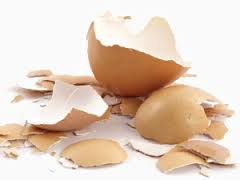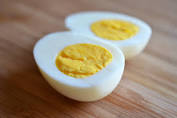s
Eggs for Dog – Good or Bad?
Health Benefits, Side Effects & Prep
http://thesmartcanine.com
(this site has some really good article, well worth a visit)
Eggs for Dog – Good or Bad?
Health Benefits, Side Effects & Prep
http://thesmartcanine.com
(this site has some really good article, well worth a visit)

Eggs are such a big part of many people’s everyday lives. We eat them in so many ways: scrambled, sunny-side up, poached, boiled and even raw. But every time there’s conversation regarding feeding popular human foods to dogs, the main questions many people ask me is:
Can dogs eat eggs? Are eggs safe for dogs to eat?
There are tons of misguided dog owners out there hearing a lot of misconceptions and advice that (probably) came from their friend’s mother’s cousin. For example, i’ve heard people telling me that eggs are unhealthy for dogs because they are high in cholesterol or can cause a deficiency in biotin in your dog. Although these egg claims have some merit to them, they are not completely true when it comes to your canine.
Dogs can safely eat eggs, in moderation.
In fact, eggs can be a very nutritious snack or supplement to the diet of your dog. Surprisingly, they are jam packed with healthy proteins, vitamins and minerals – all very beneficial to your dog.
But stop right there. Before you crack that egg open, there are things to consider and even more questions to ask before feeding them a dose of egg. Like, can dogs eat raw eggs? Can they eat egg yolk? Or, is it safe for puppies to eat egg? How much can they eat?
These are all great questions. Let’s further investigate the topics of dogs and eggs.
Health Benefits: Eggs For Dogs
Before we investigate the health benefits of feeding eggs to your dog, let’s look into the nutrients of one egg. It’s important to acknowledge the nutrients a dog may receive from an egg before discussing and investigating the potential health benefits.
A large (50 gram) egg contains:
An egg contains enough nutrients to make them an attractive meal for a predator, but also vital nutrients necessary to hatch a baby chick. Just think about that and let it sink in. Eggs have enough nutrients to grow life.
The list above shows just some of the nutrients and vitamins for dogs, but the list goes on. All of which, a dog can benefit from to a certain degree. It’s rather rare to find a food that contains as much nutrition packed in as the egg.
Healthy Egg Proteins For Dogs
As you may already know, a dog’s diet should consist of mainly protein. In fact, it may even be detrimental to your canine’s health if their diets don’t consist of mostly proteins. This means, lay low on the fruits and vegetables, although some fruits like pineapples have tremendous health benefits when given to them in moderation.
The great news is that eggs are packed with healthy high quality proteins along with all the essential amino acids. On top of that, a standard large egg (50 grams) contain just 78 calories, making them a low calorie-high protein food perfect for dogs.
The extra protein could also help your dog build muscle, strengthen the hair on their coats and repair “wear and tear” of bone tissues. This means the occasional egg might be a good ideal for an aging dog or any working dog breed.
Typically people that eat eggs in the morning are more energetic throughout the day and this is no exception for dogs. Add a bit of eggs into their diet for a boost in energy and protein!
Can dogs eat eggs? Are eggs safe for dogs to eat?
There are tons of misguided dog owners out there hearing a lot of misconceptions and advice that (probably) came from their friend’s mother’s cousin. For example, i’ve heard people telling me that eggs are unhealthy for dogs because they are high in cholesterol or can cause a deficiency in biotin in your dog. Although these egg claims have some merit to them, they are not completely true when it comes to your canine.
Dogs can safely eat eggs, in moderation.
In fact, eggs can be a very nutritious snack or supplement to the diet of your dog. Surprisingly, they are jam packed with healthy proteins, vitamins and minerals – all very beneficial to your dog.
But stop right there. Before you crack that egg open, there are things to consider and even more questions to ask before feeding them a dose of egg. Like, can dogs eat raw eggs? Can they eat egg yolk? Or, is it safe for puppies to eat egg? How much can they eat?
These are all great questions. Let’s further investigate the topics of dogs and eggs.
Health Benefits: Eggs For Dogs
Before we investigate the health benefits of feeding eggs to your dog, let’s look into the nutrients of one egg. It’s important to acknowledge the nutrients a dog may receive from an egg before discussing and investigating the potential health benefits.
A large (50 gram) egg contains:
- Choline – 35% DV
- Biotin – 27% DV
- Vitamin B12 – 23% DV
- Vitamin B2 – 20% DV
- Protein – 13% DV
- Vitamin D – 11% DV
- Vitamin A – 8% DV
An egg contains enough nutrients to make them an attractive meal for a predator, but also vital nutrients necessary to hatch a baby chick. Just think about that and let it sink in. Eggs have enough nutrients to grow life.
The list above shows just some of the nutrients and vitamins for dogs, but the list goes on. All of which, a dog can benefit from to a certain degree. It’s rather rare to find a food that contains as much nutrition packed in as the egg.
Healthy Egg Proteins For Dogs
As you may already know, a dog’s diet should consist of mainly protein. In fact, it may even be detrimental to your canine’s health if their diets don’t consist of mostly proteins. This means, lay low on the fruits and vegetables, although some fruits like pineapples have tremendous health benefits when given to them in moderation.
The great news is that eggs are packed with healthy high quality proteins along with all the essential amino acids. On top of that, a standard large egg (50 grams) contain just 78 calories, making them a low calorie-high protein food perfect for dogs.
The extra protein could also help your dog build muscle, strengthen the hair on their coats and repair “wear and tear” of bone tissues. This means the occasional egg might be a good ideal for an aging dog or any working dog breed.
Typically people that eat eggs in the morning are more energetic throughout the day and this is no exception for dogs. Add a bit of eggs into their diet for a boost in energy and protein!

Egg Shells For Dogs? Yes, Please!
Another saying I hear is that dogs cannot eat the shell of the egg. So, can dogs really eat eggshells?
Despite popular belief, dogs can eat egg shells – in fact, they’re rather healthy for them. There is some scientific evidence that supports the idea of eggshells providing an excellent source of calcium and protein for your dogs. This is ideal to help strengthen your dog’s bones or teeth.
But don’t feed them the whole broken shell because it is a choking hazard, especially for smaller dogs. Instead, crush up the shells as finely as possible and sprinkle some into their kibbles. You can use a coffee grinder for best results.
There are a lot of harmful bacteria on the shell of a raw egg. Make sure to wash them thoroughly before serving the shell to your canine. An even better solution is to boil the egg to make sure all the bacteria is dead. Either way, wait for the egg to completely dry before serving it up.
Side Effects of Feeding Dogs Eggs
Although side effects aren’t too serious or frequently seen, it is still important for dog owners to understand all the potential harms of feeding eggs to their dog. Let’s explore some known side effects of eggs.
Digestive Upset in Dogs
One of the main concerns about eggs among dog owners is that the egg whites contain an enzyme inhibitor. This inhibitor could potentially cause digestion problems in dogs, especially with young puppies and old dogs. As long as you don’t include eggs as a consistent part of the dog’s diet, then this shouldn’t be much of a problem.
Make sure to test feed eggs in the beginning with moderation in mind. If they don’t display any evidence or symptoms of digestive problems, then they are in the clear. However, always be observing after consumption of eggs.
Egg Whites and Biotin Deficiency
Another problem with egg whites is that they contain a biotin inhibitor, called Avidin. Biotin, also known as Vitamin B7, is mainly responsible for your dog’s cellular growth and fatty acid metabolism. This means that Biotin will keep the new fur (after shedding) of your dog, healthy and strong. This essential B vitamin is also necessary to keeping a healthy skin.
Although the biotin inhibitor in egg whites is problematic, it would take an extremely large amount of it to cause such a problem. As long as there is moderation, then this deficiency would be rare to experience.
Other great foods that contain Biotin include: bananas, peanut butter, salmon, avocados, blueberries and strawberries.
Eggs May Cause High Cholesterol in Dogs
For a long time, many people in the medical field have claimed that eating too many eggs could increase your cholesterol. The same theory would apply for dogs. In fact, eggs contain roughly 1.6 grams of saturated fat and 200 mg of cholesterol.
Yes, it’s true that the cholesterol in eggs is relatively high. However, there has been a lot of debate on whether eating foods that contain cholesterol will actually increase blood cholesterol levels. Some scientists believe that cholesterol is auto-regulated. This means that if your dog eats more cholesterol, their body produces less.
So does eggs actually cause high cholesterol in dogs? It may or may not. The only way to be safe is to keep the egg feeding to a moderation. Then, you wouldn’t have to worry about this debate so much.
Foods such as avocados, peanuts, pears and apples are all foods that can potentially lower your dog’s cholesterol levels.
Can Dogs Eat Egg Yolks?
Yes, dogs can safely eat egg yolks in moderation. It is never a good idea to feed just egg whites to your canine. It’s actually recommended that both are fed to the dog for a more complete nutritious snack.
Egg yolks actually contain a high amount of healthy Biotin vitamins (also known as the B7 Vitamin). And because egg whites contain Avidin, which acts as a biotin inhibitor, the egg yolk balances out the effects of the inhibitor. As long as you feed both the egg yolk and white together, there should be no concern about biotin deficiency in your dog.
Egg Yolks Benefit Canine Skin & Coat
Most people don’t correlate the words “cholesterol” and “fats” with being healthy. However, the fats and cholesterol found in egg yolks have been found to be beneficial to the dog’s skin and coat. They have been known to give your dog’s fur an extra shine, for a healthy coat appearance.
Healthy Vitamins in Egg Yolks
A big reason why egg yolks are so nutritious is because they contain so much vitamins. For example, Vitamin D helps promote strong bones by allowing the dog to absorb more calcium. The Vitamin E is responsible for proper formation of red blood cells, thus protecting body and bone tissues. On the other hand, Vitamin A will keep the eyes and vision of your dog sharp. All of these essential vitamins, make for a healthy dog.
Raw Eggs For Dogs
A common concern and question owners ask is: Can dogs eat raw eggs? Although dogs can eat raw eggs in some cases, it is not really recommended. The biggest concern dog owners express is salmonella, which is a serious bacterial infection among humans. However, a dog’s stomach is much stronger and can handle the bacteria. So far, there hasn’t been any known cases of raw eggs causing any serious illness in dogs. However, it’s better to be safe than sorry.
Another issue with raw eggs is that they contain more Avidin, the biotin inhibitor seen in egg whites. However, like with the cooked egg, it takes a lot of raw egg whites to produce this biotin deficiency in your dog.
However, raw eggs aren’t all bad. A raw egg is actually more nutritious than a cooked egg because cooking it will destroy some nutritional value, but not by much. So, it’s really up to you whether you want to feed your dog raw eggs.
From my personal experience, dogs prefer the taste of a cooked egg much more than a raw egg. When was the last time you ate a raw egg and enjoyed it? Let’s be honest.
How Can Dogs Eat Eggs?

Can Dogs Eat Boiled Eggs?
There are so many ways we consume eggs, but most of them aren’t suitable for your dog. The safest and most convenient way for dogs to eat eggs is by having it boiled. Dogs don’t need all the oil and grease involved in cooking, say, scrambled eggs. Boiled eggs are easy for them to consume and for you to prepare.
It may not be a good idea for your dog to eat a whole boiled egg, especially for smaller dogs. By having your eggs boiled, you can easily chop up the egg into smaller pieces to feed them. This will prevent any possible choking from swallowing a large chunk of the egg.
Preparing Egg Shells For Dogs
If you plan to feed the eggshell, remember to grind them up as fine as possible, preferably through a coffee grinder if you have one around. Always wash the shell or boil first before feeding the crushing and feeding the shell.
Regular eggs have a chemical sprayed on them to create a shine, so it may be a better idea to feed organic eggshells. But even with organic eggs, you never know what bacteria will be crawling all over those shells. Regardless, just wash the egg thoroughly before feeding it to your dog. It’s always better to be safe than sorry.
Introducing Eggs Into a Canine’s Diet
A dog can safely eat a few eggs a week, but don’t immediately start off with so many eggs. The most common food allergens for dogs include: dairy, wheat, lamb, beef, soy, fish, rabbit and of course, eggs. There is a possibility that your dog may be allergic to eggs, so start off small and test.
Slowly introduce eggs into their diets by starting off with a slice or two of a boiled egg. Observe them for the next 24 hours to look for any changes in behavior, such as a lack of energy, diarrhea, constipation or anything else unusual. If everything seems okay, feel free to feed them more and more. The key is to gradually increase eggs into their diet to avoid as many side effects as possible.
The Smart Canine is a dog care website dedicated in finding dog owners the best and most accurate information possible. However, we cannot and don’t expect to replace professional medical advice from a vet. We have thoroughly researched on the topic of egg consumption by dogs, but each dog is different. Without examining a dog in person, we cannot claim that a dog will receive certain health benefits or side effects.
From FOTD – if in doubt always consult your vet especially if your dog has any existing health concerns
There are so many ways we consume eggs, but most of them aren’t suitable for your dog. The safest and most convenient way for dogs to eat eggs is by having it boiled. Dogs don’t need all the oil and grease involved in cooking, say, scrambled eggs. Boiled eggs are easy for them to consume and for you to prepare.
It may not be a good idea for your dog to eat a whole boiled egg, especially for smaller dogs. By having your eggs boiled, you can easily chop up the egg into smaller pieces to feed them. This will prevent any possible choking from swallowing a large chunk of the egg.
Preparing Egg Shells For Dogs
If you plan to feed the eggshell, remember to grind them up as fine as possible, preferably through a coffee grinder if you have one around. Always wash the shell or boil first before feeding the crushing and feeding the shell.
Regular eggs have a chemical sprayed on them to create a shine, so it may be a better idea to feed organic eggshells. But even with organic eggs, you never know what bacteria will be crawling all over those shells. Regardless, just wash the egg thoroughly before feeding it to your dog. It’s always better to be safe than sorry.
Introducing Eggs Into a Canine’s Diet
A dog can safely eat a few eggs a week, but don’t immediately start off with so many eggs. The most common food allergens for dogs include: dairy, wheat, lamb, beef, soy, fish, rabbit and of course, eggs. There is a possibility that your dog may be allergic to eggs, so start off small and test.
Slowly introduce eggs into their diets by starting off with a slice or two of a boiled egg. Observe them for the next 24 hours to look for any changes in behavior, such as a lack of energy, diarrhea, constipation or anything else unusual. If everything seems okay, feel free to feed them more and more. The key is to gradually increase eggs into their diet to avoid as many side effects as possible.
The Smart Canine is a dog care website dedicated in finding dog owners the best and most accurate information possible. However, we cannot and don’t expect to replace professional medical advice from a vet. We have thoroughly researched on the topic of egg consumption by dogs, but each dog is different. Without examining a dog in person, we cannot claim that a dog will receive certain health benefits or side effects.
From FOTD – if in doubt always consult your vet especially if your dog has any existing health concerns
|
Can't seem to tire out my dog!
My dog seems tireless even though I take her to the dog park nearly every day, plus two walks of about 20 minutes each, but she never seems to slow down. |
De-stressing your dog and providing the correct physical and mental stimulation
The second one brings in mental and physical stimulation, especially daily walks, there is a noticeable improvement in the current behaviour. |




